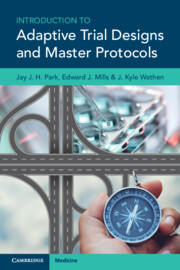Book contents
- Introduction to Adaptive Trial Designs and Master Protocols
- Introduction to Adaptive Trial Designs and Master Protocols
- Copyright page
- Content
- Preface
- About the Authors
- Part I Introduction and History of Clinical Trial Research
- Part II Basic Ingredients for Adaptive Trial Designs and Common Types
- Chapter 3 Characteristics and Principles of Adaptive Trial Designs
- Chapter 4 Common Types of Adaptive Trial Designs
- Chapter 5 Clinical Trial Simulations
- Part III Basic Ingredients for Master Protocols
- Part IV Case Studies of Adaptive Trial Designs and Master Protocols
- Part V A Practical Guide to Adaptive Trial Designs and Master Protocols
- Index
- References
Chapter 3 - Characteristics and Principles of Adaptive Trial Designs
from Part II - Basic Ingredients for Adaptive Trial Designs and Common Types
Published online by Cambridge University Press: 20 March 2023
- Introduction to Adaptive Trial Designs and Master Protocols
- Introduction to Adaptive Trial Designs and Master Protocols
- Copyright page
- Content
- Preface
- About the Authors
- Part I Introduction and History of Clinical Trial Research
- Part II Basic Ingredients for Adaptive Trial Designs and Common Types
- Chapter 3 Characteristics and Principles of Adaptive Trial Designs
- Chapter 4 Common Types of Adaptive Trial Designs
- Chapter 5 Clinical Trial Simulations
- Part III Basic Ingredients for Master Protocols
- Part IV Case Studies of Adaptive Trial Designs and Master Protocols
- Part V A Practical Guide to Adaptive Trial Designs and Master Protocols
- Index
- References
Summary
This chapter discusses the property and principles of adaptive trial designs. Adaptive trial designs refer to trial designs that offer pre-planned opportunities to modify the design of an ongoing trial based on accumulating trial data. Decisions for potential adaptations are made during the trial based on interim data, but flexibilities in adaptive trial designs are established and outlined in the study documents before any patient is recruited. For statistical planning, a simulation-guided approach is often used to evaluate the statistical properties of the design. It is generally required to demonstrate control of false positive rates for the regulatory, ethics, and funding bodies. Measures to mitigate and plan for operational bias and complexity in adaptive trial designs are needed.
- Type
- Chapter
- Information
- Publisher: Cambridge University PressPrint publication year: 2023

